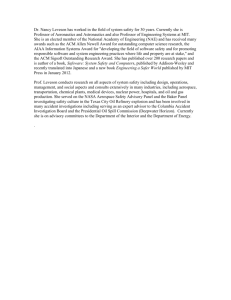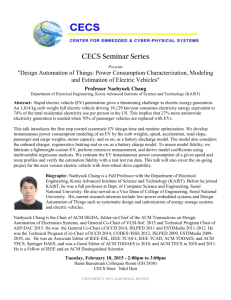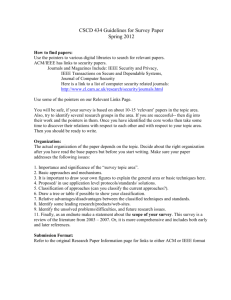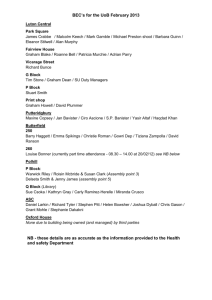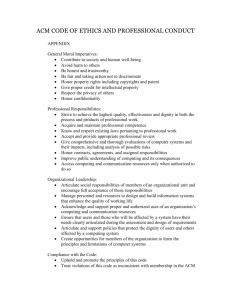Click here to get the file
advertisement
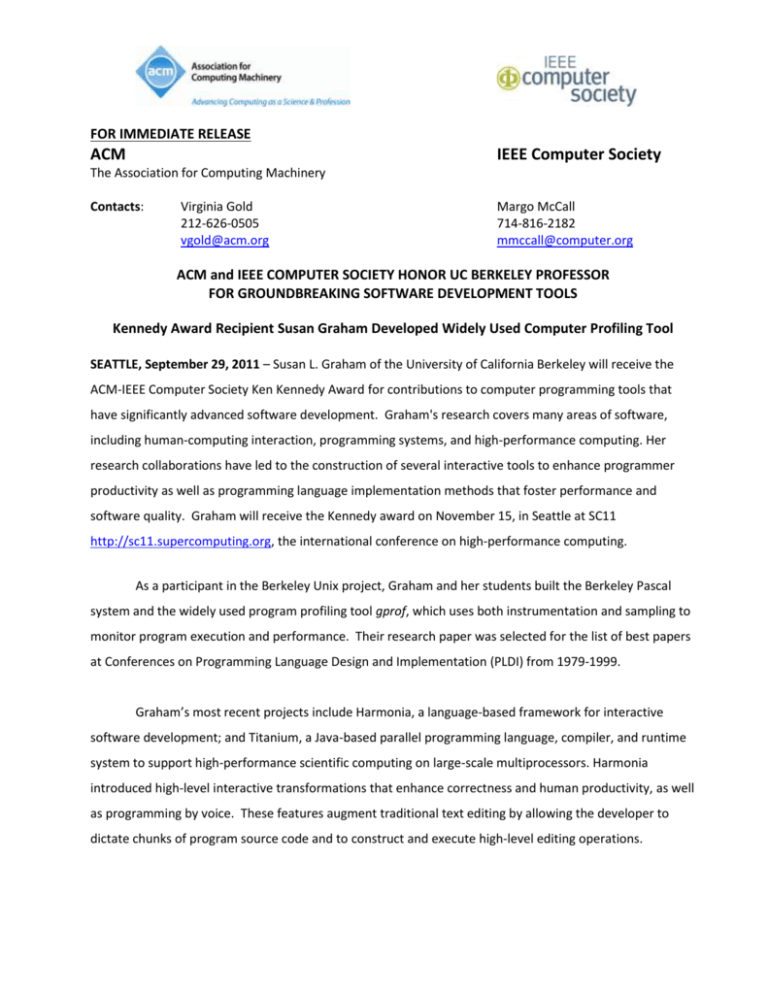
FOR IMMEDIATE RELEASE ACM IEEE Computer Society The Association for Computing Machinery Contacts: Virginia Gold 212-626-0505 vgold@acm.org Margo McCall 714-816-2182 mmccall@computer.org ACM and IEEE COMPUTER SOCIETY HONOR UC BERKELEY PROFESSOR FOR GROUNDBREAKING SOFTWARE DEVELOPMENT TOOLS Kennedy Award Recipient Susan Graham Developed Widely Used Computer Profiling Tool SEATTLE, September 29, 2011 – Susan L. Graham of the University of California Berkeley will receive the ACM-IEEE Computer Society Ken Kennedy Award for contributions to computer programming tools that have significantly advanced software development. Graham's research covers many areas of software, including human-computing interaction, programming systems, and high-performance computing. Her research collaborations have led to the construction of several interactive tools to enhance programmer productivity as well as programming language implementation methods that foster performance and software quality. Graham will receive the Kennedy award on November 15, in Seattle at SC11 http://sc11.supercomputing.org, the international conference on high-performance computing. ability an As a participant in the Berkeley Unix project, Graham and her students built the Berkeley Pascal system and the widely used program profiling tool gprof, which uses both instrumentation and sampling to monitor program execution and performance. Their research paper was selected for the list of best papers at Conferences on Programming Language Design and Implementation (PLDI) from 1979-1999. Graham’s most recent projects include Harmonia, a language-based framework for interactive software development; and Titanium, a Java-based parallel programming language, compiler, and runtime system to support high-performance scientific computing on large-scale multiprocessors. Harmonia introduced high-level interactive transformations that enhance correctness and human productivity, as well as programming by voice. These features augment traditional text editing by allowing the developer to dictate chunks of program source code and to construct and execute high-level editing operations. Graham is the Pehong Chen Distinguished Professor of Electrical Engineering and Computer Science Emerita at the UC Berkeley. She is an ACM Fellow and a Fellow of the American Academy of Arts and Sciences, and the American Association for the Advancement of Science. Graham is also a member of National Academy of Engineering, and the founding editor-in-chief of ACM Transactions on Programming Languages and Systems. She currently serves as vice-chair of the Council of the Computing Community Consortium, which is sponsored by the National Science Foundation. A graduate of Harvard University with an A.B. in Mathematics, Graham received M.S. and Ph.D. degrees in Computer Science from Stanford University. She served on the U.S. President’s Information Technology Advisory Committee (PITAC) under President Clinton, and as the Chief Computer Scientist for the National Science Foundation-sponsored National Partnership for Advanced Computational Infrastructure (NPACI) from 1997 to 2005. She also co-chaired a National Research Council study on the Future of Supercomputing. She is a former president of the Harvard Board of Overseers and serves on the Harvard Corporation. Among Graham’s other honors are the ACM SIGPLAN Career Programming Language Achievement Award (2000), the ACM Distinguished Service Award (2006), the Harvard Medal (2008), the IEEE Von Neumann Medal (2009), and the Berkeley Citation (2009). ACM and the Computer Society co-sponsor the Kennedy Award http://awards.acm.org/homepage.cfm?awd=167 , which was established in 2009 to recognize substantial contributions to programmability and productivity in computing and significant community service or mentoring contributions. It was named for the late Ken Kennedy, founder of Rice University’s computer science program and a world expert on high-performance computing. The Kennedy Award carries a US $5,000 honorarium endowed by the ACM Special Interest Group on Computer Architecture (SIGARCH) and the Computer Society. About ACM ACM, the Association for Computing Machinery www.acm.org, unites computing educators, researchers and professionals to inspire dialogue, share resources and address the field’s challenges. ACM strengthens the computing profession’s collective voice through strong leadership, promotion of the highest standards, and recognition of technical excellence. ACM supports the professional growth of its members by providing opportunities for life-long learning, career development, and professional networking. About the IEEE Computer Society The IEEE Computer Society www.computer.org, one of IEEE’s 38 societies, is dedicated to advancing the theory, practice, and application of computer and information processing technology. Through its conferences, applications-related and research-oriented journals, local and student chapters, distance learning campus, and technical committees, the Society promotes an active exchange of information, ideas, and technological innovation among its members. ###

